Nursing Program Report: Ethical Considerations in Nursing Practice
VerifiedAdded on 2020/10/22
|8
|2647
|325
Report
AI Summary
This report provides a comprehensive overview of a nursing program, focusing on critical reflections on various aspects of nursing practice. The report begins with an introduction highlighting the importance of teamwork and the development of essential skills. It then delves into evidence for Applied Prior Learning (APL), including reflections on incidents that influenced the decision to become a nurse and the application of Graduate and Transferable Skills (GTS) in a future nursing career. The report also includes a critical reflection on a recent nursing research article discussing fall risk reduction in older adults, analyzing the risk factors and preventive actions. Furthermore, it examines ethical issues related to inter-professional team working, emphasizing the importance of patient dignity, confidentiality, and adherence to ethical guidelines. The conclusion summarizes the key findings, reinforcing the significance of ethical considerations and professional development in the nursing field.
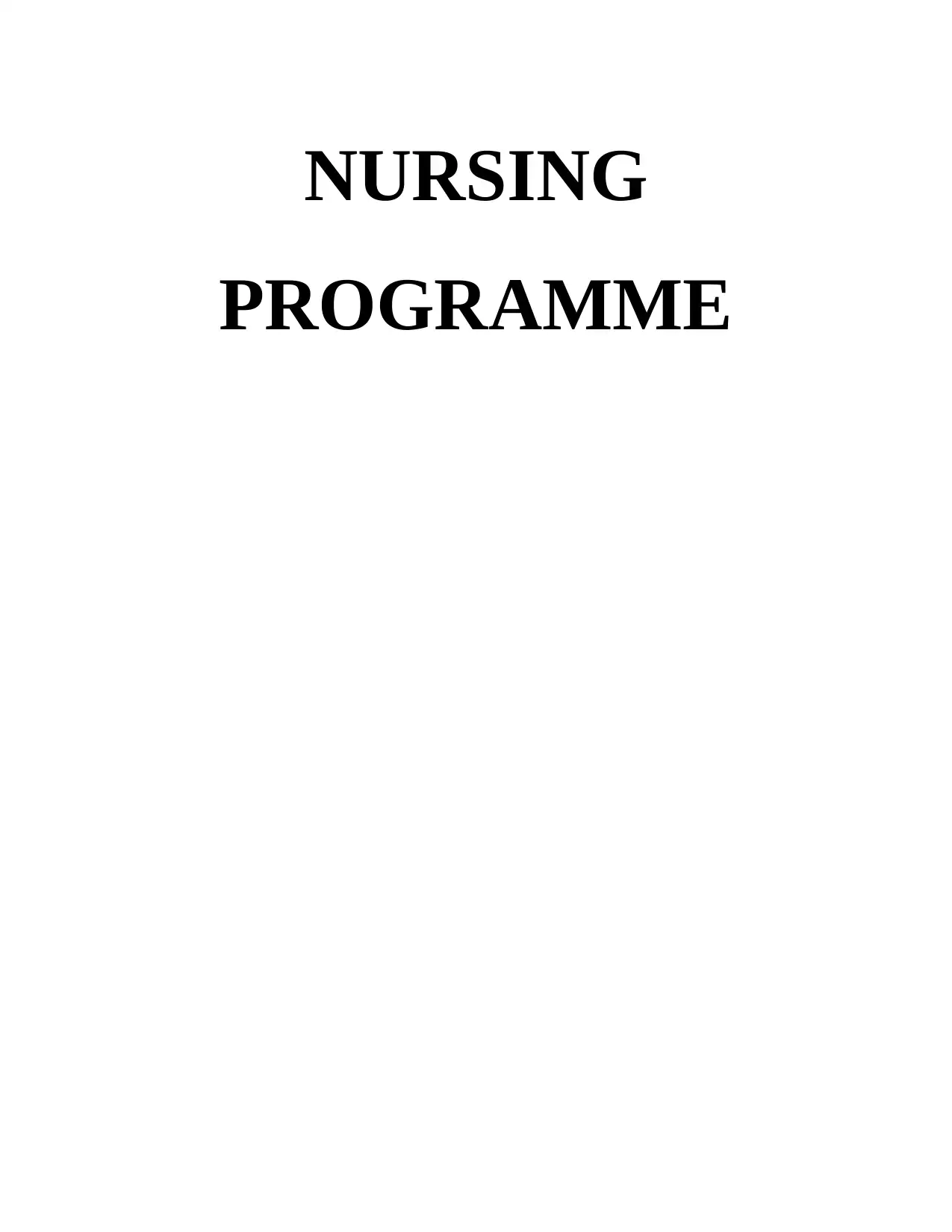
NURSING
PROGRAMME
PROGRAMME
Paraphrase This Document
Need a fresh take? Get an instant paraphrase of this document with our AI Paraphraser
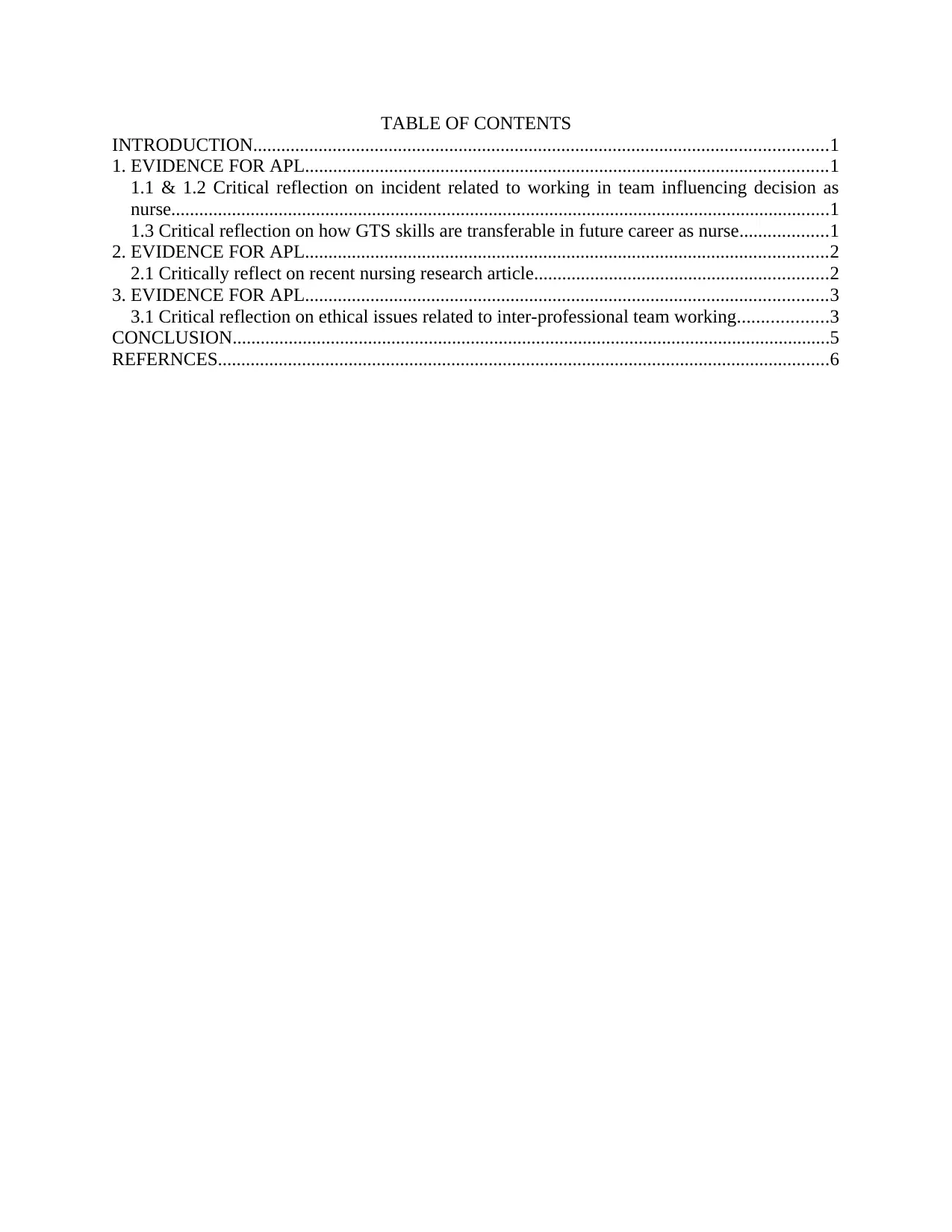
TABLE OF CONTENTS
INTRODUCTION...........................................................................................................................1
1. EVIDENCE FOR APL................................................................................................................1
1.1 & 1.2 Critical reflection on incident related to working in team influencing decision as
nurse.............................................................................................................................................1
1.3 Critical reflection on how GTS skills are transferable in future career as nurse...................1
2. EVIDENCE FOR APL................................................................................................................2
2.1 Critically reflect on recent nursing research article...............................................................2
3. EVIDENCE FOR APL................................................................................................................3
3.1 Critical reflection on ethical issues related to inter-professional team working...................3
CONCLUSION................................................................................................................................5
REFERNCES...................................................................................................................................6
INTRODUCTION...........................................................................................................................1
1. EVIDENCE FOR APL................................................................................................................1
1.1 & 1.2 Critical reflection on incident related to working in team influencing decision as
nurse.............................................................................................................................................1
1.3 Critical reflection on how GTS skills are transferable in future career as nurse...................1
2. EVIDENCE FOR APL................................................................................................................2
2.1 Critically reflect on recent nursing research article...............................................................2
3. EVIDENCE FOR APL................................................................................................................3
3.1 Critical reflection on ethical issues related to inter-professional team working...................3
CONCLUSION................................................................................................................................5
REFERNCES...................................................................................................................................6
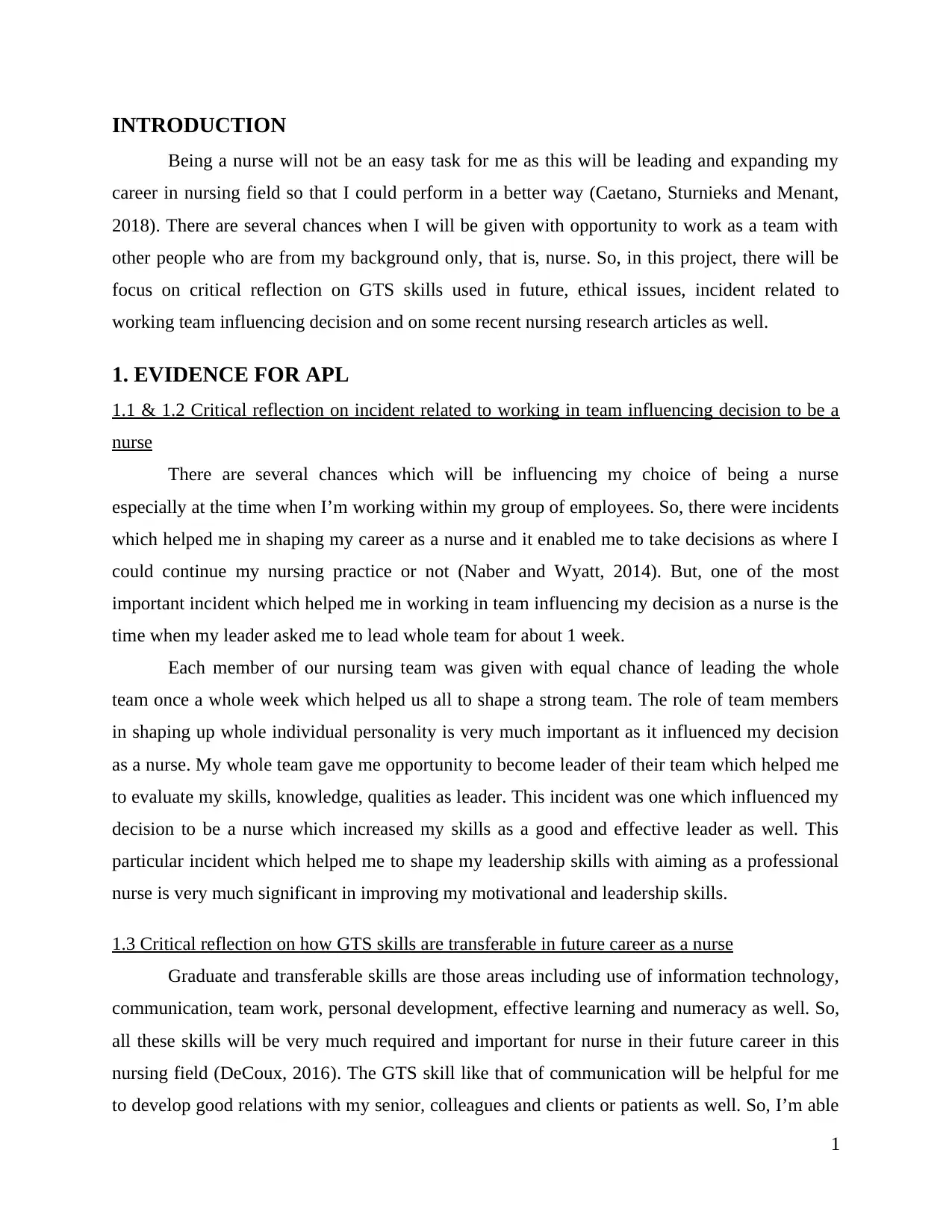
INTRODUCTION
Being a nurse will not be an easy task for me as this will be leading and expanding my
career in nursing field so that I could perform in a better way (Caetano, Sturnieks and Menant,
2018). There are several chances when I will be given with opportunity to work as a team with
other people who are from my background only, that is, nurse. So, in this project, there will be
focus on critical reflection on GTS skills used in future, ethical issues, incident related to
working team influencing decision and on some recent nursing research articles as well.
1. EVIDENCE FOR APL
1.1 & 1.2 Critical reflection on incident related to working in team influencing decision to be a
nurse
There are several chances which will be influencing my choice of being a nurse
especially at the time when I’m working within my group of employees. So, there were incidents
which helped me in shaping my career as a nurse and it enabled me to take decisions as where I
could continue my nursing practice or not (Naber and Wyatt, 2014). But, one of the most
important incident which helped me in working in team influencing my decision as a nurse is the
time when my leader asked me to lead whole team for about 1 week.
Each member of our nursing team was given with equal chance of leading the whole
team once a whole week which helped us all to shape a strong team. The role of team members
in shaping up whole individual personality is very much important as it influenced my decision
as a nurse. My whole team gave me opportunity to become leader of their team which helped me
to evaluate my skills, knowledge, qualities as leader. This incident was one which influenced my
decision to be a nurse which increased my skills as a good and effective leader as well. This
particular incident which helped me to shape my leadership skills with aiming as a professional
nurse is very much significant in improving my motivational and leadership skills.
1.3 Critical reflection on how GTS skills are transferable in future career as a nurse
Graduate and transferable skills are those areas including use of information technology,
communication, team work, personal development, effective learning and numeracy as well. So,
all these skills will be very much required and important for nurse in their future career in this
nursing field (DeCoux, 2016). The GTS skill like that of communication will be helpful for me
to develop good relations with my senior, colleagues and clients or patients as well. So, I’m able
1
Being a nurse will not be an easy task for me as this will be leading and expanding my
career in nursing field so that I could perform in a better way (Caetano, Sturnieks and Menant,
2018). There are several chances when I will be given with opportunity to work as a team with
other people who are from my background only, that is, nurse. So, in this project, there will be
focus on critical reflection on GTS skills used in future, ethical issues, incident related to
working team influencing decision and on some recent nursing research articles as well.
1. EVIDENCE FOR APL
1.1 & 1.2 Critical reflection on incident related to working in team influencing decision to be a
nurse
There are several chances which will be influencing my choice of being a nurse
especially at the time when I’m working within my group of employees. So, there were incidents
which helped me in shaping my career as a nurse and it enabled me to take decisions as where I
could continue my nursing practice or not (Naber and Wyatt, 2014). But, one of the most
important incident which helped me in working in team influencing my decision as a nurse is the
time when my leader asked me to lead whole team for about 1 week.
Each member of our nursing team was given with equal chance of leading the whole
team once a whole week which helped us all to shape a strong team. The role of team members
in shaping up whole individual personality is very much important as it influenced my decision
as a nurse. My whole team gave me opportunity to become leader of their team which helped me
to evaluate my skills, knowledge, qualities as leader. This incident was one which influenced my
decision to be a nurse which increased my skills as a good and effective leader as well. This
particular incident which helped me to shape my leadership skills with aiming as a professional
nurse is very much significant in improving my motivational and leadership skills.
1.3 Critical reflection on how GTS skills are transferable in future career as a nurse
Graduate and transferable skills are those areas including use of information technology,
communication, team work, personal development, effective learning and numeracy as well. So,
all these skills will be very much required and important for nurse in their future career in this
nursing field (DeCoux, 2016). The GTS skill like that of communication will be helpful for me
to develop good relations with my senior, colleagues and clients or patients as well. So, I’m able
1
⊘ This is a preview!⊘
Do you want full access?
Subscribe today to unlock all pages.

Trusted by 1+ million students worldwide
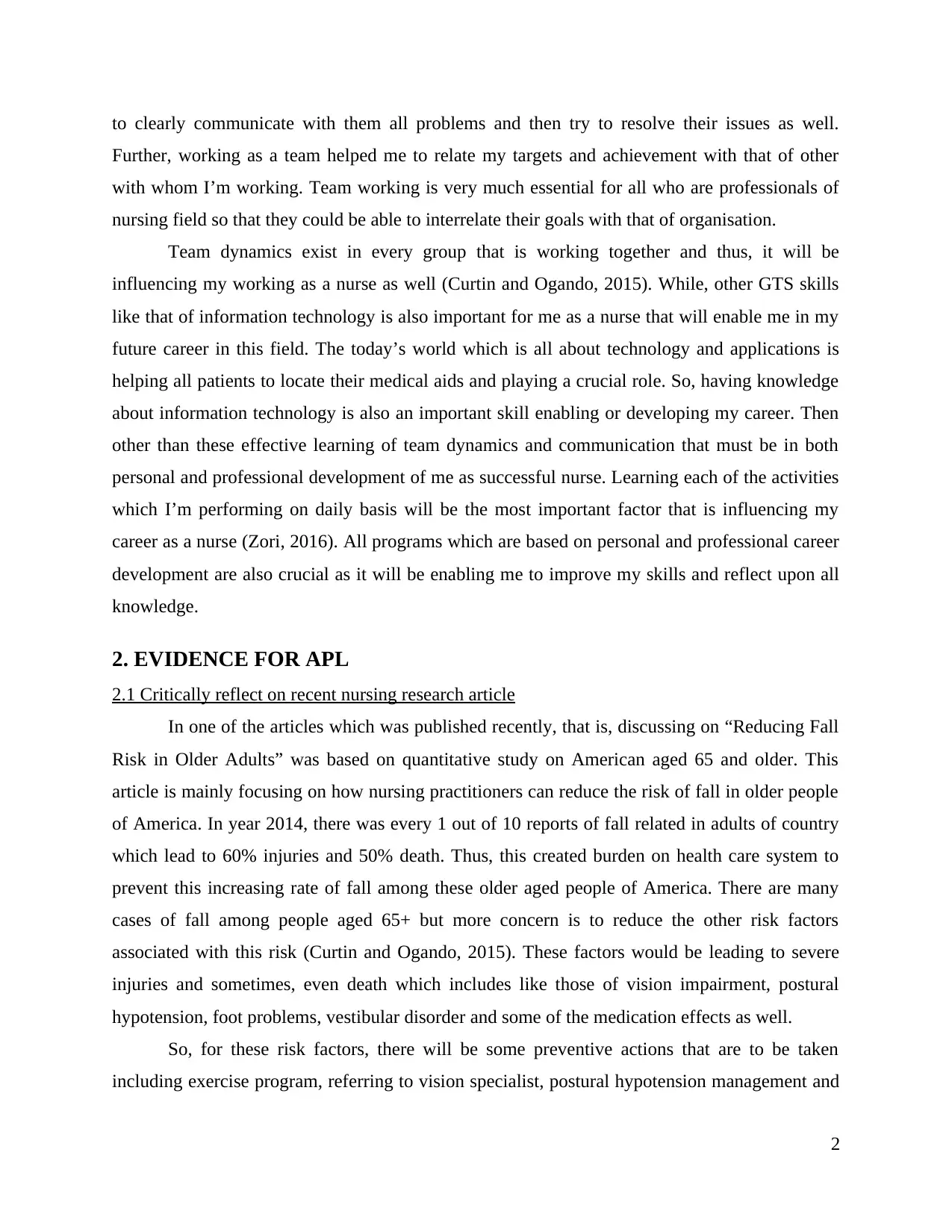
to clearly communicate with them all problems and then try to resolve their issues as well.
Further, working as a team helped me to relate my targets and achievement with that of other
with whom I’m working. Team working is very much essential for all who are professionals of
nursing field so that they could be able to interrelate their goals with that of organisation.
Team dynamics exist in every group that is working together and thus, it will be
influencing my working as a nurse as well (Curtin and Ogando, 2015). While, other GTS skills
like that of information technology is also important for me as a nurse that will enable me in my
future career in this field. The today’s world which is all about technology and applications is
helping all patients to locate their medical aids and playing a crucial role. So, having knowledge
about information technology is also an important skill enabling or developing my career. Then
other than these effective learning of team dynamics and communication that must be in both
personal and professional development of me as successful nurse. Learning each of the activities
which I’m performing on daily basis will be the most important factor that is influencing my
career as a nurse (Zori, 2016). All programs which are based on personal and professional career
development are also crucial as it will be enabling me to improve my skills and reflect upon all
knowledge.
2. EVIDENCE FOR APL
2.1 Critically reflect on recent nursing research article
In one of the articles which was published recently, that is, discussing on “Reducing Fall
Risk in Older Adults” was based on quantitative study on American aged 65 and older. This
article is mainly focusing on how nursing practitioners can reduce the risk of fall in older people
of America. In year 2014, there was every 1 out of 10 reports of fall related in adults of country
which lead to 60% injuries and 50% death. Thus, this created burden on health care system to
prevent this increasing rate of fall among these older aged people of America. There are many
cases of fall among people aged 65+ but more concern is to reduce the other risk factors
associated with this risk (Curtin and Ogando, 2015). These factors would be leading to severe
injuries and sometimes, even death which includes like those of vision impairment, postural
hypotension, foot problems, vestibular disorder and some of the medication effects as well.
So, for these risk factors, there will be some preventive actions that are to be taken
including exercise program, referring to vision specialist, postural hypotension management and
2
Further, working as a team helped me to relate my targets and achievement with that of other
with whom I’m working. Team working is very much essential for all who are professionals of
nursing field so that they could be able to interrelate their goals with that of organisation.
Team dynamics exist in every group that is working together and thus, it will be
influencing my working as a nurse as well (Curtin and Ogando, 2015). While, other GTS skills
like that of information technology is also important for me as a nurse that will enable me in my
future career in this field. The today’s world which is all about technology and applications is
helping all patients to locate their medical aids and playing a crucial role. So, having knowledge
about information technology is also an important skill enabling or developing my career. Then
other than these effective learning of team dynamics and communication that must be in both
personal and professional development of me as successful nurse. Learning each of the activities
which I’m performing on daily basis will be the most important factor that is influencing my
career as a nurse (Zori, 2016). All programs which are based on personal and professional career
development are also crucial as it will be enabling me to improve my skills and reflect upon all
knowledge.
2. EVIDENCE FOR APL
2.1 Critically reflect on recent nursing research article
In one of the articles which was published recently, that is, discussing on “Reducing Fall
Risk in Older Adults” was based on quantitative study on American aged 65 and older. This
article is mainly focusing on how nursing practitioners can reduce the risk of fall in older people
of America. In year 2014, there was every 1 out of 10 reports of fall related in adults of country
which lead to 60% injuries and 50% death. Thus, this created burden on health care system to
prevent this increasing rate of fall among these older aged people of America. There are many
cases of fall among people aged 65+ but more concern is to reduce the other risk factors
associated with this risk (Curtin and Ogando, 2015). These factors would be leading to severe
injuries and sometimes, even death which includes like those of vision impairment, postural
hypotension, foot problems, vestibular disorder and some of the medication effects as well.
So, for these risk factors, there will be some preventive actions that are to be taken
including exercise program, referring to vision specialist, postural hypotension management and
2
Paraphrase This Document
Need a fresh take? Get an instant paraphrase of this document with our AI Paraphraser
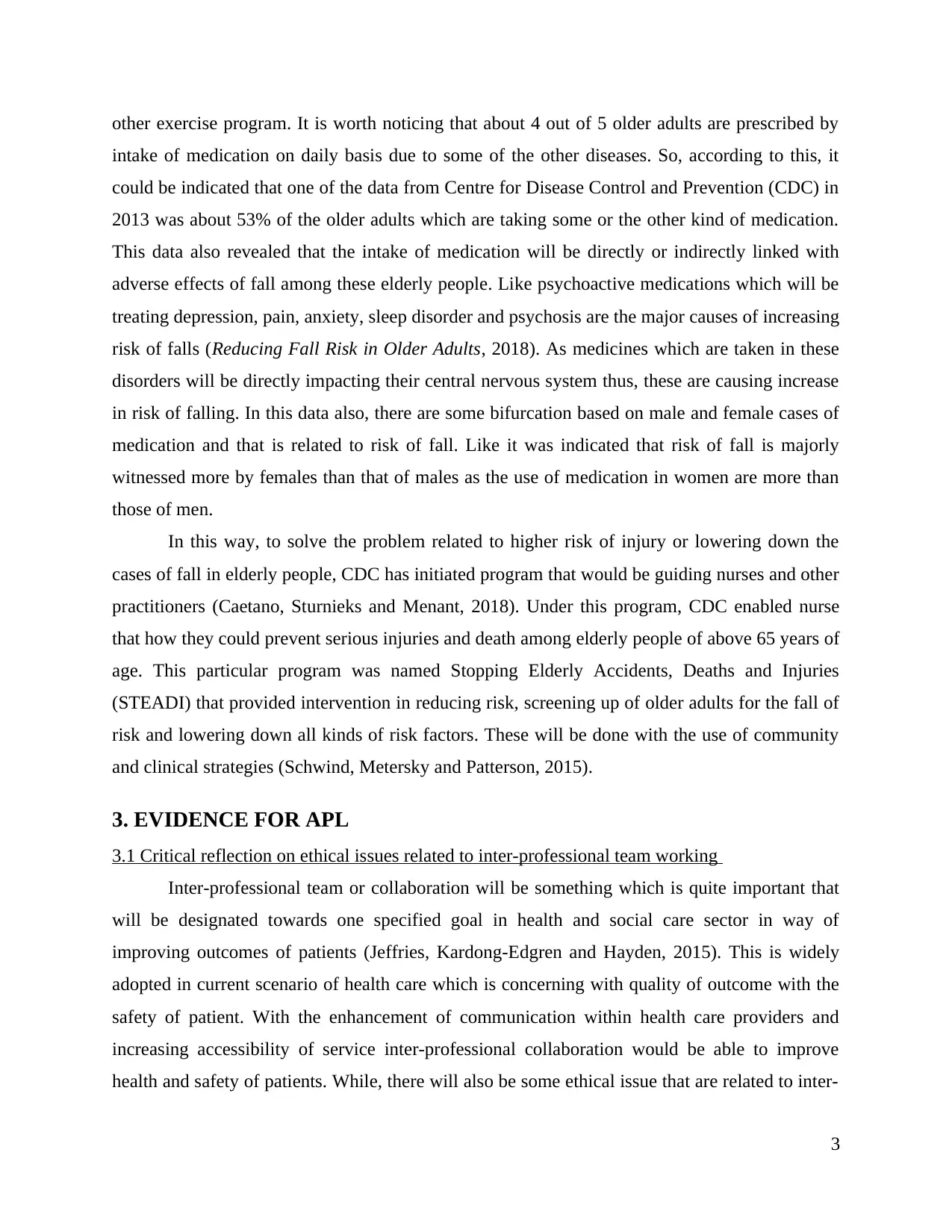
other exercise program. It is worth noticing that about 4 out of 5 older adults are prescribed by
intake of medication on daily basis due to some of the other diseases. So, according to this, it
could be indicated that one of the data from Centre for Disease Control and Prevention (CDC) in
2013 was about 53% of the older adults which are taking some or the other kind of medication.
This data also revealed that the intake of medication will be directly or indirectly linked with
adverse effects of fall among these elderly people. Like psychoactive medications which will be
treating depression, pain, anxiety, sleep disorder and psychosis are the major causes of increasing
risk of falls (Reducing Fall Risk in Older Adults, 2018). As medicines which are taken in these
disorders will be directly impacting their central nervous system thus, these are causing increase
in risk of falling. In this data also, there are some bifurcation based on male and female cases of
medication and that is related to risk of fall. Like it was indicated that risk of fall is majorly
witnessed more by females than that of males as the use of medication in women are more than
those of men.
In this way, to solve the problem related to higher risk of injury or lowering down the
cases of fall in elderly people, CDC has initiated program that would be guiding nurses and other
practitioners (Caetano, Sturnieks and Menant, 2018). Under this program, CDC enabled nurse
that how they could prevent serious injuries and death among elderly people of above 65 years of
age. This particular program was named Stopping Elderly Accidents, Deaths and Injuries
(STEADI) that provided intervention in reducing risk, screening up of older adults for the fall of
risk and lowering down all kinds of risk factors. These will be done with the use of community
and clinical strategies (Schwind, Metersky and Patterson, 2015).
3. EVIDENCE FOR APL
3.1 Critical reflection on ethical issues related to inter-professional team working
Inter-professional team or collaboration will be something which is quite important that
will be designated towards one specified goal in health and social care sector in way of
improving outcomes of patients (Jeffries, Kardong-Edgren and Hayden, 2015). This is widely
adopted in current scenario of health care which is concerning with quality of outcome with the
safety of patient. With the enhancement of communication within health care providers and
increasing accessibility of service inter-professional collaboration would be able to improve
health and safety of patients. While, there will also be some ethical issue that are related to inter-
3
intake of medication on daily basis due to some of the other diseases. So, according to this, it
could be indicated that one of the data from Centre for Disease Control and Prevention (CDC) in
2013 was about 53% of the older adults which are taking some or the other kind of medication.
This data also revealed that the intake of medication will be directly or indirectly linked with
adverse effects of fall among these elderly people. Like psychoactive medications which will be
treating depression, pain, anxiety, sleep disorder and psychosis are the major causes of increasing
risk of falls (Reducing Fall Risk in Older Adults, 2018). As medicines which are taken in these
disorders will be directly impacting their central nervous system thus, these are causing increase
in risk of falling. In this data also, there are some bifurcation based on male and female cases of
medication and that is related to risk of fall. Like it was indicated that risk of fall is majorly
witnessed more by females than that of males as the use of medication in women are more than
those of men.
In this way, to solve the problem related to higher risk of injury or lowering down the
cases of fall in elderly people, CDC has initiated program that would be guiding nurses and other
practitioners (Caetano, Sturnieks and Menant, 2018). Under this program, CDC enabled nurse
that how they could prevent serious injuries and death among elderly people of above 65 years of
age. This particular program was named Stopping Elderly Accidents, Deaths and Injuries
(STEADI) that provided intervention in reducing risk, screening up of older adults for the fall of
risk and lowering down all kinds of risk factors. These will be done with the use of community
and clinical strategies (Schwind, Metersky and Patterson, 2015).
3. EVIDENCE FOR APL
3.1 Critical reflection on ethical issues related to inter-professional team working
Inter-professional team or collaboration will be something which is quite important that
will be designated towards one specified goal in health and social care sector in way of
improving outcomes of patients (Jeffries, Kardong-Edgren and Hayden, 2015). This is widely
adopted in current scenario of health care which is concerning with quality of outcome with the
safety of patient. With the enhancement of communication within health care providers and
increasing accessibility of service inter-professional collaboration would be able to improve
health and safety of patients. While, there will also be some ethical issue that are related to inter-
3
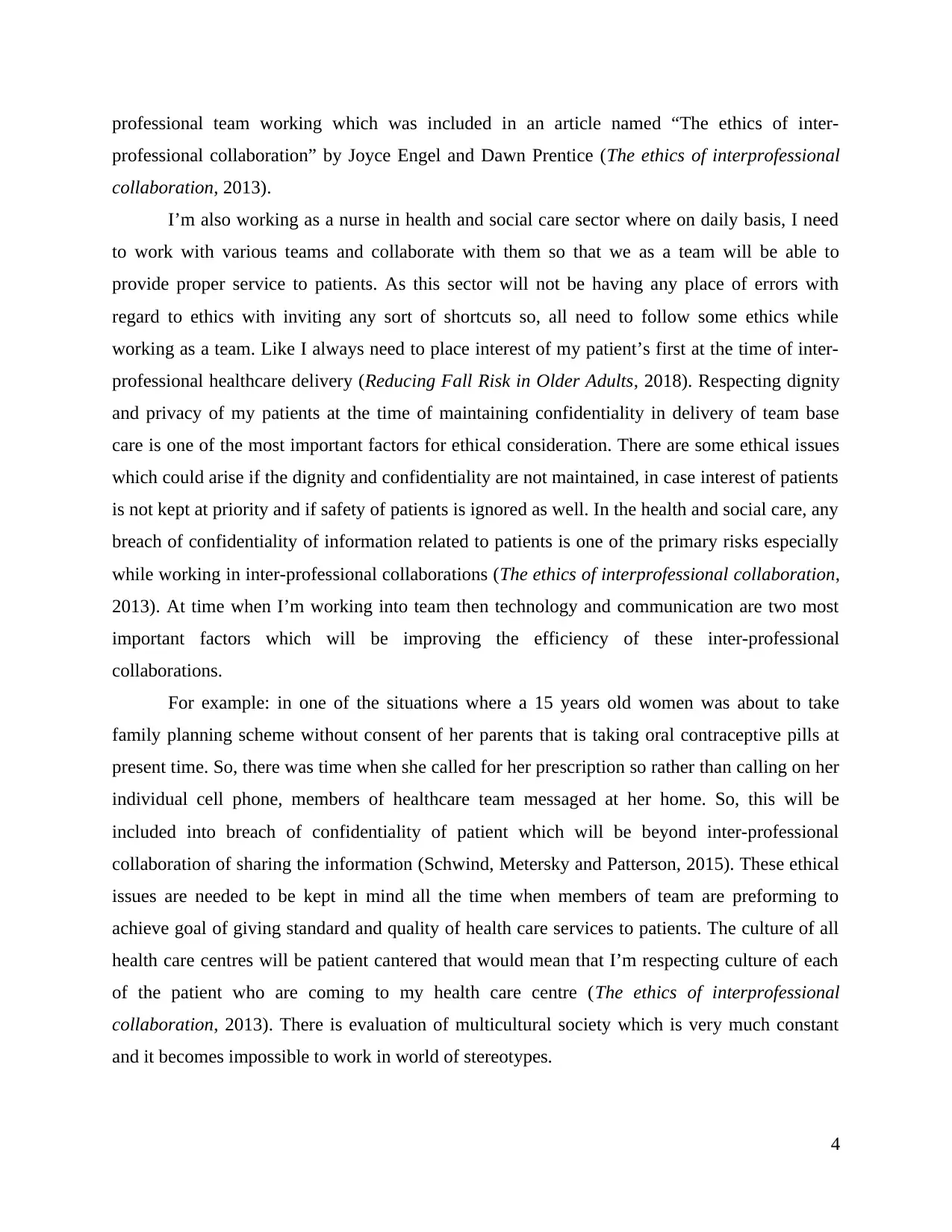
professional team working which was included in an article named “The ethics of inter-
professional collaboration” by Joyce Engel and Dawn Prentice (The ethics of interprofessional
collaboration, 2013).
I’m also working as a nurse in health and social care sector where on daily basis, I need
to work with various teams and collaborate with them so that we as a team will be able to
provide proper service to patients. As this sector will not be having any place of errors with
regard to ethics with inviting any sort of shortcuts so, all need to follow some ethics while
working as a team. Like I always need to place interest of my patient’s first at the time of inter-
professional healthcare delivery (Reducing Fall Risk in Older Adults, 2018). Respecting dignity
and privacy of my patients at the time of maintaining confidentiality in delivery of team base
care is one of the most important factors for ethical consideration. There are some ethical issues
which could arise if the dignity and confidentiality are not maintained, in case interest of patients
is not kept at priority and if safety of patients is ignored as well. In the health and social care, any
breach of confidentiality of information related to patients is one of the primary risks especially
while working in inter-professional collaborations (The ethics of interprofessional collaboration,
2013). At time when I’m working into team then technology and communication are two most
important factors which will be improving the efficiency of these inter-professional
collaborations.
For example: in one of the situations where a 15 years old women was about to take
family planning scheme without consent of her parents that is taking oral contraceptive pills at
present time. So, there was time when she called for her prescription so rather than calling on her
individual cell phone, members of healthcare team messaged at her home. So, this will be
included into breach of confidentiality of patient which will be beyond inter-professional
collaboration of sharing the information (Schwind, Metersky and Patterson, 2015). These ethical
issues are needed to be kept in mind all the time when members of team are preforming to
achieve goal of giving standard and quality of health care services to patients. The culture of all
health care centres will be patient cantered that would mean that I’m respecting culture of each
of the patient who are coming to my health care centre (The ethics of interprofessional
collaboration, 2013). There is evaluation of multicultural society which is very much constant
and it becomes impossible to work in world of stereotypes.
4
professional collaboration” by Joyce Engel and Dawn Prentice (The ethics of interprofessional
collaboration, 2013).
I’m also working as a nurse in health and social care sector where on daily basis, I need
to work with various teams and collaborate with them so that we as a team will be able to
provide proper service to patients. As this sector will not be having any place of errors with
regard to ethics with inviting any sort of shortcuts so, all need to follow some ethics while
working as a team. Like I always need to place interest of my patient’s first at the time of inter-
professional healthcare delivery (Reducing Fall Risk in Older Adults, 2018). Respecting dignity
and privacy of my patients at the time of maintaining confidentiality in delivery of team base
care is one of the most important factors for ethical consideration. There are some ethical issues
which could arise if the dignity and confidentiality are not maintained, in case interest of patients
is not kept at priority and if safety of patients is ignored as well. In the health and social care, any
breach of confidentiality of information related to patients is one of the primary risks especially
while working in inter-professional collaborations (The ethics of interprofessional collaboration,
2013). At time when I’m working into team then technology and communication are two most
important factors which will be improving the efficiency of these inter-professional
collaborations.
For example: in one of the situations where a 15 years old women was about to take
family planning scheme without consent of her parents that is taking oral contraceptive pills at
present time. So, there was time when she called for her prescription so rather than calling on her
individual cell phone, members of healthcare team messaged at her home. So, this will be
included into breach of confidentiality of patient which will be beyond inter-professional
collaboration of sharing the information (Schwind, Metersky and Patterson, 2015). These ethical
issues are needed to be kept in mind all the time when members of team are preforming to
achieve goal of giving standard and quality of health care services to patients. The culture of all
health care centres will be patient cantered that would mean that I’m respecting culture of each
of the patient who are coming to my health care centre (The ethics of interprofessional
collaboration, 2013). There is evaluation of multicultural society which is very much constant
and it becomes impossible to work in world of stereotypes.
4
⊘ This is a preview!⊘
Do you want full access?
Subscribe today to unlock all pages.

Trusted by 1+ million students worldwide
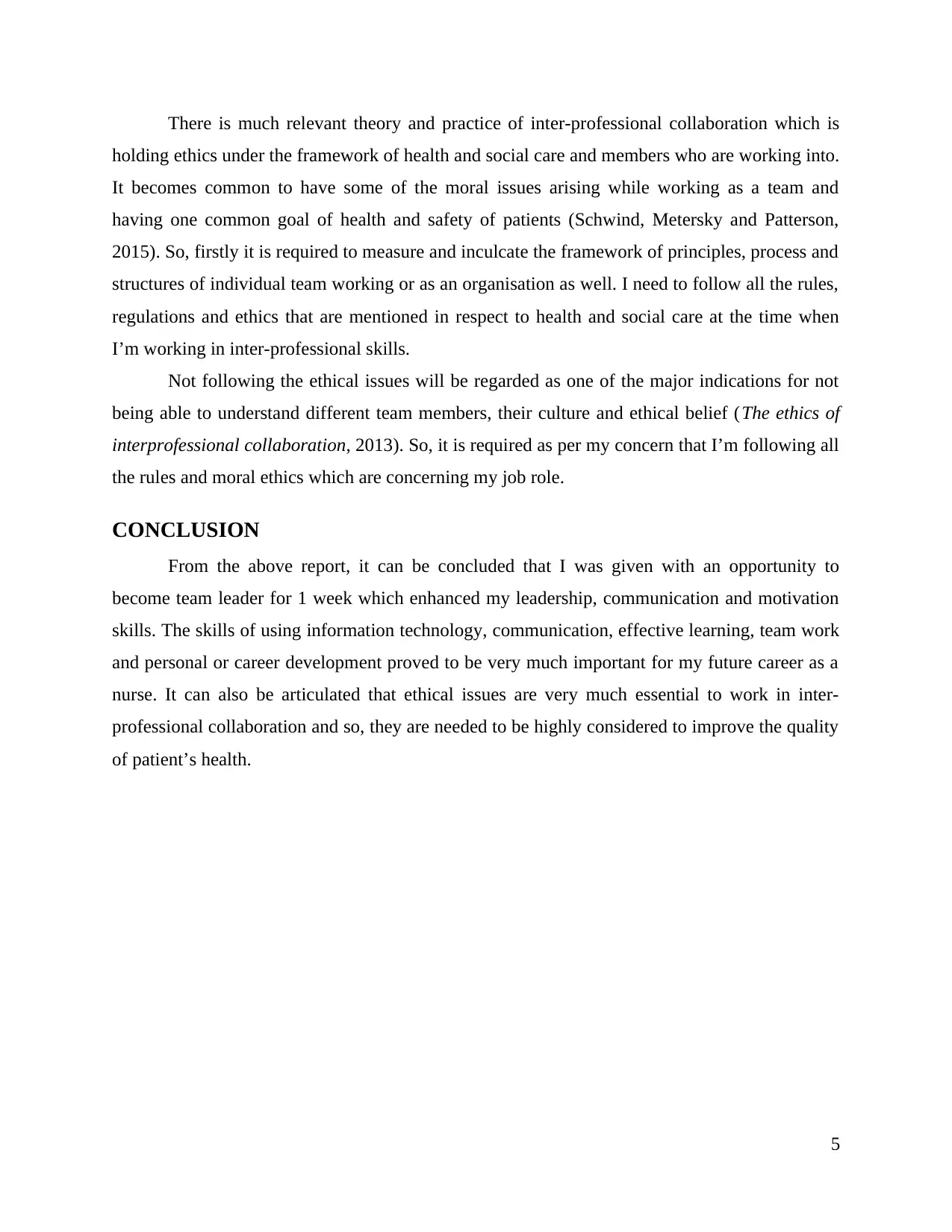
There is much relevant theory and practice of inter-professional collaboration which is
holding ethics under the framework of health and social care and members who are working into.
It becomes common to have some of the moral issues arising while working as a team and
having one common goal of health and safety of patients (Schwind, Metersky and Patterson,
2015). So, firstly it is required to measure and inculcate the framework of principles, process and
structures of individual team working or as an organisation as well. I need to follow all the rules,
regulations and ethics that are mentioned in respect to health and social care at the time when
I’m working in inter-professional skills.
Not following the ethical issues will be regarded as one of the major indications for not
being able to understand different team members, their culture and ethical belief (The ethics of
interprofessional collaboration, 2013). So, it is required as per my concern that I’m following all
the rules and moral ethics which are concerning my job role.
CONCLUSION
From the above report, it can be concluded that I was given with an opportunity to
become team leader for 1 week which enhanced my leadership, communication and motivation
skills. The skills of using information technology, communication, effective learning, team work
and personal or career development proved to be very much important for my future career as a
nurse. It can also be articulated that ethical issues are very much essential to work in inter-
professional collaboration and so, they are needed to be highly considered to improve the quality
of patient’s health.
5
holding ethics under the framework of health and social care and members who are working into.
It becomes common to have some of the moral issues arising while working as a team and
having one common goal of health and safety of patients (Schwind, Metersky and Patterson,
2015). So, firstly it is required to measure and inculcate the framework of principles, process and
structures of individual team working or as an organisation as well. I need to follow all the rules,
regulations and ethics that are mentioned in respect to health and social care at the time when
I’m working in inter-professional skills.
Not following the ethical issues will be regarded as one of the major indications for not
being able to understand different team members, their culture and ethical belief (The ethics of
interprofessional collaboration, 2013). So, it is required as per my concern that I’m following all
the rules and moral ethics which are concerning my job role.
CONCLUSION
From the above report, it can be concluded that I was given with an opportunity to
become team leader for 1 week which enhanced my leadership, communication and motivation
skills. The skills of using information technology, communication, effective learning, team work
and personal or career development proved to be very much important for my future career as a
nurse. It can also be articulated that ethical issues are very much essential to work in inter-
professional collaboration and so, they are needed to be highly considered to improve the quality
of patient’s health.
5
Paraphrase This Document
Need a fresh take? Get an instant paraphrase of this document with our AI Paraphraser
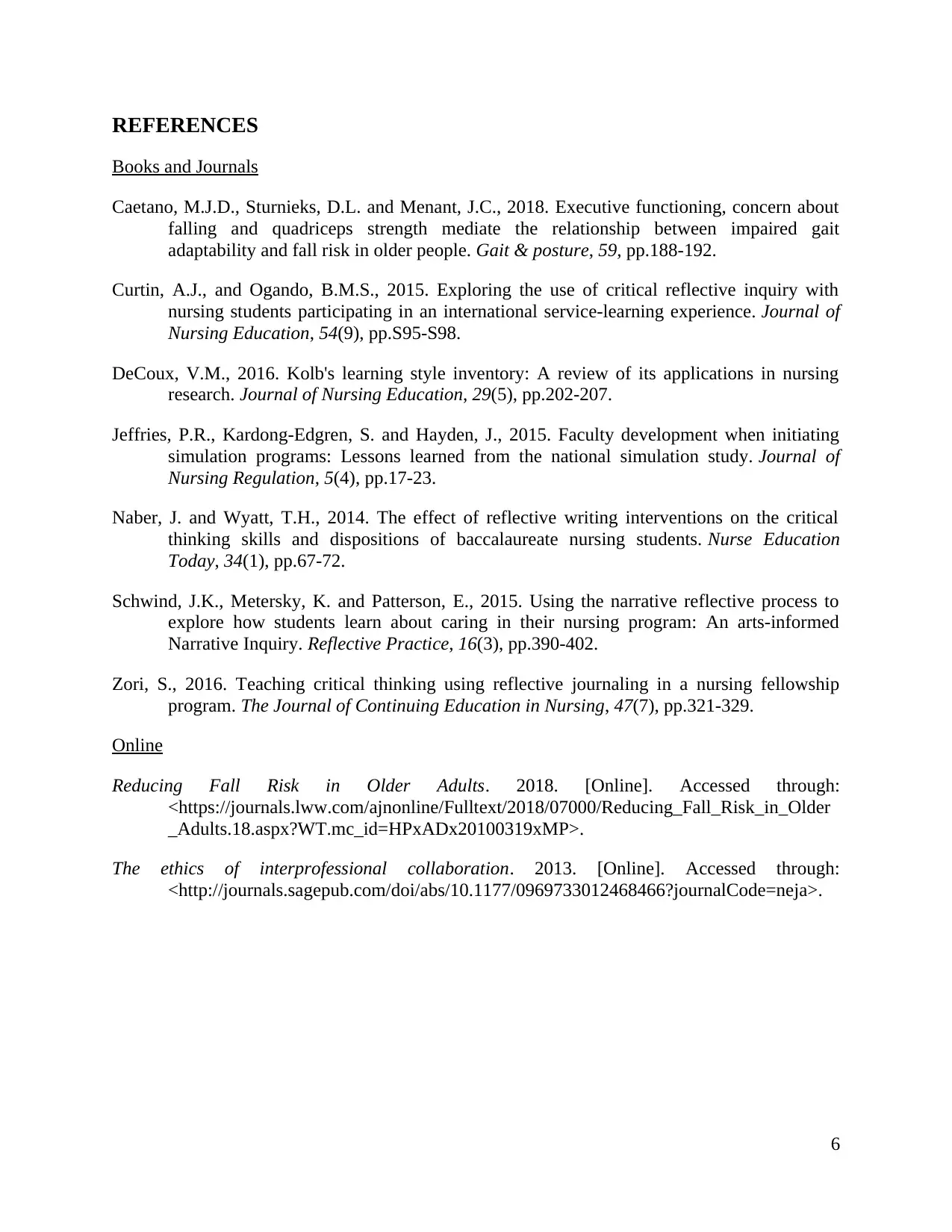
REFERENCES
Books and Journals
Caetano, M.J.D., Sturnieks, D.L. and Menant, J.C., 2018. Executive functioning, concern about
falling and quadriceps strength mediate the relationship between impaired gait
adaptability and fall risk in older people. Gait & posture, 59, pp.188-192.
Curtin, A.J., and Ogando, B.M.S., 2015. Exploring the use of critical reflective inquiry with
nursing students participating in an international service-learning experience. Journal of
Nursing Education, 54(9), pp.S95-S98.
DeCoux, V.M., 2016. Kolb's learning style inventory: A review of its applications in nursing
research. Journal of Nursing Education, 29(5), pp.202-207.
Jeffries, P.R., Kardong-Edgren, S. and Hayden, J., 2015. Faculty development when initiating
simulation programs: Lessons learned from the national simulation study. Journal of
Nursing Regulation, 5(4), pp.17-23.
Naber, J. and Wyatt, T.H., 2014. The effect of reflective writing interventions on the critical
thinking skills and dispositions of baccalaureate nursing students. Nurse Education
Today, 34(1), pp.67-72.
Schwind, J.K., Metersky, K. and Patterson, E., 2015. Using the narrative reflective process to
explore how students learn about caring in their nursing program: An arts-informed
Narrative Inquiry. Reflective Practice, 16(3), pp.390-402.
Zori, S., 2016. Teaching critical thinking using reflective journaling in a nursing fellowship
program. The Journal of Continuing Education in Nursing, 47(7), pp.321-329.
Online
Reducing Fall Risk in Older Adults. 2018. [Online]. Accessed through:
<https://journals.lww.com/ajnonline/Fulltext/2018/07000/Reducing_Fall_Risk_in_Older
_Adults.18.aspx?WT.mc_id=HPxADx20100319xMP>.
The ethics of interprofessional collaboration. 2013. [Online]. Accessed through:
<http://journals.sagepub.com/doi/abs/10.1177/0969733012468466?journalCode=neja>.
6
Books and Journals
Caetano, M.J.D., Sturnieks, D.L. and Menant, J.C., 2018. Executive functioning, concern about
falling and quadriceps strength mediate the relationship between impaired gait
adaptability and fall risk in older people. Gait & posture, 59, pp.188-192.
Curtin, A.J., and Ogando, B.M.S., 2015. Exploring the use of critical reflective inquiry with
nursing students participating in an international service-learning experience. Journal of
Nursing Education, 54(9), pp.S95-S98.
DeCoux, V.M., 2016. Kolb's learning style inventory: A review of its applications in nursing
research. Journal of Nursing Education, 29(5), pp.202-207.
Jeffries, P.R., Kardong-Edgren, S. and Hayden, J., 2015. Faculty development when initiating
simulation programs: Lessons learned from the national simulation study. Journal of
Nursing Regulation, 5(4), pp.17-23.
Naber, J. and Wyatt, T.H., 2014. The effect of reflective writing interventions on the critical
thinking skills and dispositions of baccalaureate nursing students. Nurse Education
Today, 34(1), pp.67-72.
Schwind, J.K., Metersky, K. and Patterson, E., 2015. Using the narrative reflective process to
explore how students learn about caring in their nursing program: An arts-informed
Narrative Inquiry. Reflective Practice, 16(3), pp.390-402.
Zori, S., 2016. Teaching critical thinking using reflective journaling in a nursing fellowship
program. The Journal of Continuing Education in Nursing, 47(7), pp.321-329.
Online
Reducing Fall Risk in Older Adults. 2018. [Online]. Accessed through:
<https://journals.lww.com/ajnonline/Fulltext/2018/07000/Reducing_Fall_Risk_in_Older
_Adults.18.aspx?WT.mc_id=HPxADx20100319xMP>.
The ethics of interprofessional collaboration. 2013. [Online]. Accessed through:
<http://journals.sagepub.com/doi/abs/10.1177/0969733012468466?journalCode=neja>.
6
1 out of 8
Related Documents
Your All-in-One AI-Powered Toolkit for Academic Success.
+13062052269
info@desklib.com
Available 24*7 on WhatsApp / Email
![[object Object]](/_next/static/media/star-bottom.7253800d.svg)
Unlock your academic potential
Copyright © 2020–2026 A2Z Services. All Rights Reserved. Developed and managed by ZUCOL.





